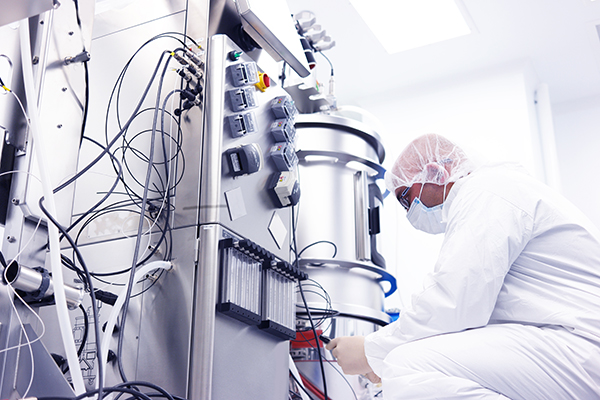The field of regenerative medicine and cell therapy is rapidly advancing, bringing novel treatments for conditions that have historically lacked effective therapies. As the science progresses and more cell therapies enter clinical trials and receive regulatory approval, large-scale manufacturing capabilities are needed to produce the cell products and make these treatments accessible to patients.
Current State of the Field
Cell Therapy Manufacturing combines elements of bioprocessing, quality control, and logistics to transform human cells into therapeutic products. Currently, most cell therapies in clinical use are being manufactured in a research lab or “cleanroom” facility rather than a full-scale commercial manufacturing plant. This allows for testing and validation of processes but limits the number of patients that can be treated. As therapies move farther into late-stage clinical trials and approval, larger production capacities are required.
With a few exceptions like CAR-T cell therapies, most regenerative medicines are still in early-stage development and evaluating safety and efficacy in small patient populations. As the clinical evidence base grows, demonstrating benefits for certain conditions, companies must gear up their manufacturing capabilities to meet future demand if the therapies receive regulatory approval. This transition from small batches in academic labs to industrial-scale production presents unique technical and scientific challenges.
Key Considerations in Cell Therapy Manufacturing
There are several core components that must be optimized for large-scale, commercial-grade manufacturing of cell therapies:
Starting Materials and Cell Sources
Many cell therapies rely on human cells that are isolated from a patient’s own tissues like bone marrow, fat, or blood. For some conditions like spinal cord injury, donated fetal cells or stem cells are used. Having high quality, standardized starting materials is crucial.
Cell Processing and Manipulation
Once cells are acquired, they often undergo processing like isolation, expansion, genetic modification, or differentiation. Robust and reproducible methods are needed for manipulating cells in a sterile, controlled environment.
Culture Systems and Bioreactors
Facilities must have the appropriate cell culture equipment like multi-layer cell stacks or bioreactors to grow cells at large scales over several weeks. Ensuring sterile conditions and maintaining optimal parameters is critical.
Quality Control and Characterization
Rigorous testing is required at multiple stages to verify identity, purity, viability, and other critical quality attributes of the developing cell products. Manufacturing processes must be tightly controlled and validated.
Crysopreservation and Thaw Processes
For cell therapies meant to be frozen and stored long-term, reliable methods are needed for freezing cells without damaging viability while maintaining sterility during thawing when patients receive treatment.
Supply Chain and Logistics Management
From sourcing raw materials to shipping finished products, advanced logistics networks and supply chain expertise is required to coordinate the manufacturing process and deliver cell therapies to patients globally. Ensuring traceability and compliance with stringent regulations is a priority.
Developing Scalable and Robust Processes
Translating cell manufacturing methods optimized for the lab to industrial-scale production requires extensive process development, validation, and characterization work. Automation, single-use equipment, and digital tools are playing a larger role in enhancing scalability, reproducibility, and quality. Organizations like the Cell Therapy Manufacturing Consortium are bringing industry leaders together to optimize shared technologies and resources for advanced therapeutics like mesenchymal stem cells, CAR-T cells, and more.
One challenge lies in designing flexible, modular facilities that can support multiple cell therapy candidates from clinical trials through to commercialization. Equipment like cell processing modules, bioreactors, and freezers need to seamlessly integrate while maintaining strict separation of different products and batches. Manufacturers are building plants with cleanrooms sized for production of millions to billions of therapeutic cells.
Advanced analytics are also necessary to monitor and control complex manufacturing processes. Real-time release testing, process analytical technology tools, and predictive computational modeling can help ensure reproducible quality while speeding up process development and approval timelines. As the first wave of commercial cell therapy manufacturing plants come online in the coming years, they aim to establish manufacturing platforms that can reliably and cost-effectively serve future cell therapy pipelines.
Regulatory Considerations and Market Access
In addition to technical expertise, navigating complex regulations governing cellular medicines will be crucial for cell therapy manufacturers. Close agency partnerships are needed throughout development to lay out requirements for validating processes, testing, and production consistency. Many manufacturers are pursuing regulatory designations like RMAT pathway in the US and PRIME scheme in Europe to expedite review timelines.
Lastly, demonstrating value and health economic benefits will be key for market access and reimbursement as these advanced therapies can carry high price tags due to complex manufacturing. Success of the early commercial cell therapies may help pave the way for broader market viability and insurance coverage of future regenerative medicines.
The field of cell therapy manufacturing is advancing rapidly as the first commercial products come to market and a new generation of technologies and treatments enter the pipeline. Developing standardized and robust manufacturing processes at industrial scales presents major technical challenges but also opportunities to establish an integrated, global ecosystem capable of supporting the next wave of personalized and regenerative medicines. With continued progress on key fronts, cell therapy production may transform from a small-scale venture to a core component of modern healthcare systems worldwide.
*Note:
1. Source: Coherent Market Insights, Public sources, Desk research
2. We have leveraged AI tools to mine information and compile it

